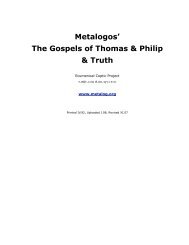Andrew Louth - Syriac Christian Church
Andrew Louth - Syriac Christian Church
Andrew Louth - Syriac Christian Church
Create successful ePaper yourself
Turn your PDF publications into a flip-book with our unique Google optimized e-Paper software.
58 THE DOCTRINE OF THE PERSON OF CHRIST<br />
out the nature that we have. What makes the Son of God the unique<br />
person he is is the eternal life of love in the Trinity in which he shares<br />
in a filial way.<br />
MAXIMUS’ UNDERSTANDING OF THE WILL<br />
There are several problems in the way of understanding Maximus’<br />
conception of willing. The first is quite simply that it seems that<br />
his analysis of the human will, though it draws on earlier thought, not<br />
least that of Aristotle, is largely original. Maximus is not using an<br />
already available notion of the will, but thinking through something<br />
that appears to be quite new in the history of human thought (though<br />
Maximus was anxious not to appear to be an ‘innovator’). 10 But if, as<br />
has been suggested, Maximus virtually creates the notion of the<br />
will, 11 understanding him is compounded by the fact that this notion,<br />
so central to Maximus’ understanding of what it is to be human, is<br />
also something that much modern thought tends to take for granted.<br />
For whatever problems there are in understanding Maximus, it is<br />
certainly not the case that he has an oversimplified way of<br />
understanding human nature, but rather that we have, borne to us by<br />
the concepts and values of our Western culture that has shaped us.<br />
Maximus’ understanding of human nature is many-layered: more than<br />
some other Fathers is he free from the tendency (found in many<br />
classical philosophers, too) to oversimplify what it is to be human, and<br />
to locate the human in our intellectual, rational capacity. Rather to be<br />
human is to be a creature that loves with a love that integrates the<br />
several layers of our being, layers some of which we share with the<br />
non-rational, and even non-animal creation. In so far as it belongs to<br />
the twentieth century (and also some earlier ones) to oversimplify<br />
what it is to be human, and locate that in our will, in our (pretended)<br />
ability to do what we want, to choose between this and that, such an<br />
oversimplification makes Maximus utterly opaque to our<br />
understanding.<br />
For Maximus, what is distinctive about being human is selfdetermination<br />
(autexousios kinêsis: movement that is within one’s own<br />
power). Twice Maximus takes his definition of what is involved in selfdetermination<br />
from the fifth-century bishop, Diadochus of Photikê:<br />
‘self-determination is the unhindered willing of a rational soul<br />
towards whatever it wishes’. 12 This self-determination is not,<br />
however, absolute: human beings are created in God’s image, and it is<br />
in their self-determination that they reflect God’s image. This selfdetermination<br />
is, then, ordered towards God: human beings are<br />
creatures whose nature finds its fulfilment in their freely turning<br />
towards the God to whom they owe their being. What is meant by




